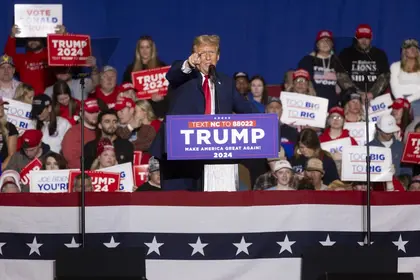Political analysts have frequently noted the “division” within the Republican party between “centrist” Reagan Republicans and Trump’s “Make America Great Again” (MAGA) Republicans. Nikki Haley recently warned that “the party is completely divided”, adding “you can’t win the general election if you don’t acknowledge the 40 percent of Republicans who are saying ‘we don’t want Donald Trump’.”
Not a single American who has any shred of Ukrainian heritage or is concerned about the clear and present (foreign and domestic) danger of a second Trump term, should vote for him.
JOIN US ON TELEGRAM
Follow our coverage of the war on the @Kyivpost_official.
The recent Democrat primary in Michigan illustrates the effectiveness of a united Arab American vote in swing states when minority blocs can make the difference. Even a few hundred votes in a contested state can determine the outcome of an election – as was the case with George W. Bush in Florida. This same logic should compel Ukrainian and other Americans – especially those who are “conservative Republicans” – to vote against Trump in November.
Trump is no Reagan
Having had the privilege of knowing Ronald Reagan and working in his administration, I recall when he was wounded by a gunman and a half dozen doctors hovered over him at the operating table. He relieved their troubled looks by smiling and saying: “I hope all you fellows are Republicans”. Trump, by contrast, boasted at a campaign rally: “I could stand in the middle of Fifth Avenue and shoot somebody and wouldn’t lose any voters.”

Zelensky Condemns New Orleans Terror Attack Leaving 10 Dead, Dozens Injured in US
Trump has often compared himself to Reagan. While there are some similarities in several of their policies, the similarities end there. There is a world of difference in the problems they have encountered and how they approached solving them.
Reagan took office at the height of the “American malaise” – a period of unease, dissatisfaction, and pessimism. The country was experiencing its bleakest economic times since the Great Depression. But Reagan – both an inspiring leader and unifying problem solver – restored the nation’s optimism, confidence, and status as “the shining city on the hill” and the beacon of hope for all those aspiring for freedom.
Reagan’s imprint on the world was huge and long-lasting. But despite the national media’s daily attacks on him and his administration, Americans awarded him with the highest grade ever achieved by any US president – a winning sweep of 49 out of 50 states for a second term – effectively an A+.
Trump, on the other hand, took over a healthy growing economy with low inflation and low interest rates. ISIS was still active, but much reduced as a terrorist threat. The US was considering an exit strategy for Afghanistan and Russia was preoccupied with the fourth year of trench warfare in Ukraine. The two largest issues he faced were migration and parity with China.
Despite his partial success in stemming the uncontrolled flow of migrants, Americans were unimpressed with Trump’s performance and tired of his daily “it’s-all-about-me” whining, nasty Tweets, lies, scandals, bleach injections, “love letters” with bloody tinpot tyrants, complaints about the “deep state”, and stormy relations with his staff.
They awarded him seven states fewer than for his first term – only 23 out of 50 states supported his continued occupancy of the White House and seven million votes shy of his Democrat contender. Of the 31 presidents who aspired for a second term, Trump joins the losing third as the nation gave him a grade “F” and an eviction notice.
Trump’s explanation that the election was “stolen” was not substantiated in numerous court filings, audits, and reviews (including by his Attorney General and hired experts) and deemed to be delusional.
Let’s take a look at just some of the reasons why voting for Trump would be dangerous, not only for the US but for the world order.
Reckless foreign policy
“Under Trump, Ukraine’s survival as a sovereign entity may be at stake. And Putin knows it.”
Russia’s war in Ukraine is not the only “trouble spot” in the world, but it is the most immediate, and most likely to have global, long-lasting ramifications.
Trump’s highly controversial sentiments towards Russian President Vladimir Putin and NATO are well-known and need not be restated. A list of possible actions in a second Trump term would likely include:
- The US leaving NATO
- Potentially denying Ukraine’s entry into NATO;
- Denying further aid to Ukraine
- Recognizing Russia’s claim to Crimea and possibly additional parts of occupied territory
- Withdrawing US forces rashly from potential hot spots around the world
- Trusting Putin more than his intelligence community
- Encouraging the further break-up of the EU
- Favoring the Saudis because of long-standing family financial relationships
- Downplaying human rights abuses around the world
Trust in the US as a reliable partner would quickly dry up and nations would revert to the law of the jungle as bigger powers rush to expand their territorial claims and hegemonies.
Under Trump, Ukraine’s survival as a fully independent, united, democratic, and sovereign entity may be at stake, and Europe’s and America’s security would be at risk. And yes, Putin knows it.
A president’s “fitness” for office affects everything they say, do or fail to do. Erratic decisions may prove catastrophic. Just as Reagan’s presidency is marked by exceptional fitness, Trump’s is marked by serious doubts about his fitness.
Loyalty, laws and tradition
The US relies on a system of governance that provides checks against abusive and erratic decisions and actions by high government officials. Laws protecting civil service employees, while accommodating the reforms and new directions that incoming “political” appointees may bring, ensure a stable ship of state with opportunities for innovation and renewal.
But this critically important safeguard is now in jeopardy. During his presidency, Trump signed an executive order known as “Schedule F.” This order stripped job protections from career officials in policy roles, making it easier to replace them with people loyal to him.
He has likened those who oppose him to “vermin” and pledged to “root them out”. Professor Richard H. Pildes of Ney York University (NYU) Law School stated that “Trump’s demand that government actors pledge loyalty to him, as opposed to law or constitution is a corruption of the rule of law and government institutions.” Indeed, such a demand bears a strong resemblance to Putin’s or Hungarian Prime Minister Viktor Orban’s government.
Corruption and disloyalty to the Constitution
“Welcome to the end of democracy. We are here to overthrow it completely.”
Trump biographer Timothy L. O’Brien, in his book “TrumpNation: The Art of Being Donald,” describes Trump’s primary outcome as being “self-aggrandizement and self-preservation” with a surprising ability to “corrupt people around him.”
Michael Kruse, in Politico Magazine, quotes O’Brian as telling him that Trump has a “predatory personality… polluting everything he’s touched.”
Trump’s commitment and loyalty to the Constitution are also suspect. Although the trial is scheduled for later this year, the publicly disclosed evidence of intentional fraud by Trump and his advisers to subvert an election – the very cornerstone of democracy and the Constitution – is devastating.
Other than revolution or anarchy, the only way Americans can make their voices heard by the government or initiate peaceful succession is through honest and transparent elections. A criminal scheme was hatched and initiated to have fraudulent electoral votes accepted as legitimate and to pressure the Vice President to reject the legitimate electoral votes from six states.
Professor Akhil Amar of Yale Law School asserted that Trump’s actions since the election “have threatened the very existence of our constitutional democracy.” Significantly, one of Trump’s more outspoken acolytes at the Conservative Political Action Conference (CPAC) endorsed the professor’s comments: “Welcome to the end of democracy. We are here to overthrow it completely.”
Mental health
By focusing on President Joe Biden’s age, forgetfulness, and gaffes, Trump and his campaign have opened the door to delve into the issue of mental health and fitness. Although three years younger, Trump has already displayed even more advanced signs of senility with the slurring of words, forgetfulness, stumbling and confusion. Let’s not forget he introduced his wife as “Mercedes,” confused Nikki Haley with the Hungarian prime minister, and Nancy Pelosi with the president of Turkey.
Dr. John Gartner, a psychologist and former professor at John Hopkins Medical School has sounded the alarm that while “Biden’s brain is aging, Trump’s brain is dementing” and may even be at an early stage of Alzheimer’s.
There is a great deal more that can be said about Trump’s bizarre practices and comments but I highly recommend that the reader view the video Unfit: The Psychology of Donald Trump to help decide whether Trump can be trusted with his finger on the nuclear button or to meet world leaders. We already know that he cannot be trusted with access to classified material.
In conclusion
By Trump’s own words and record, as well as the testimony of those who were close to him and those who are qualified to comment, Trump appears to be a sick, vindictive, and bitter man. His oft-expressed concern about America’s well-being is contradicted by his comment about hoping the economy would “crash” before the election, and urging the rejection of a strong border control bill.
He simply wants conditions for Americans to deteriorate for the next 10 months so that he can be elected. That is not what Reagan or Reagan conservatives would expect from a patriotic American.
The views expressed are the author’s and not necessarily of Kyiv Post.
You can also highlight the text and press Ctrl + Enter






